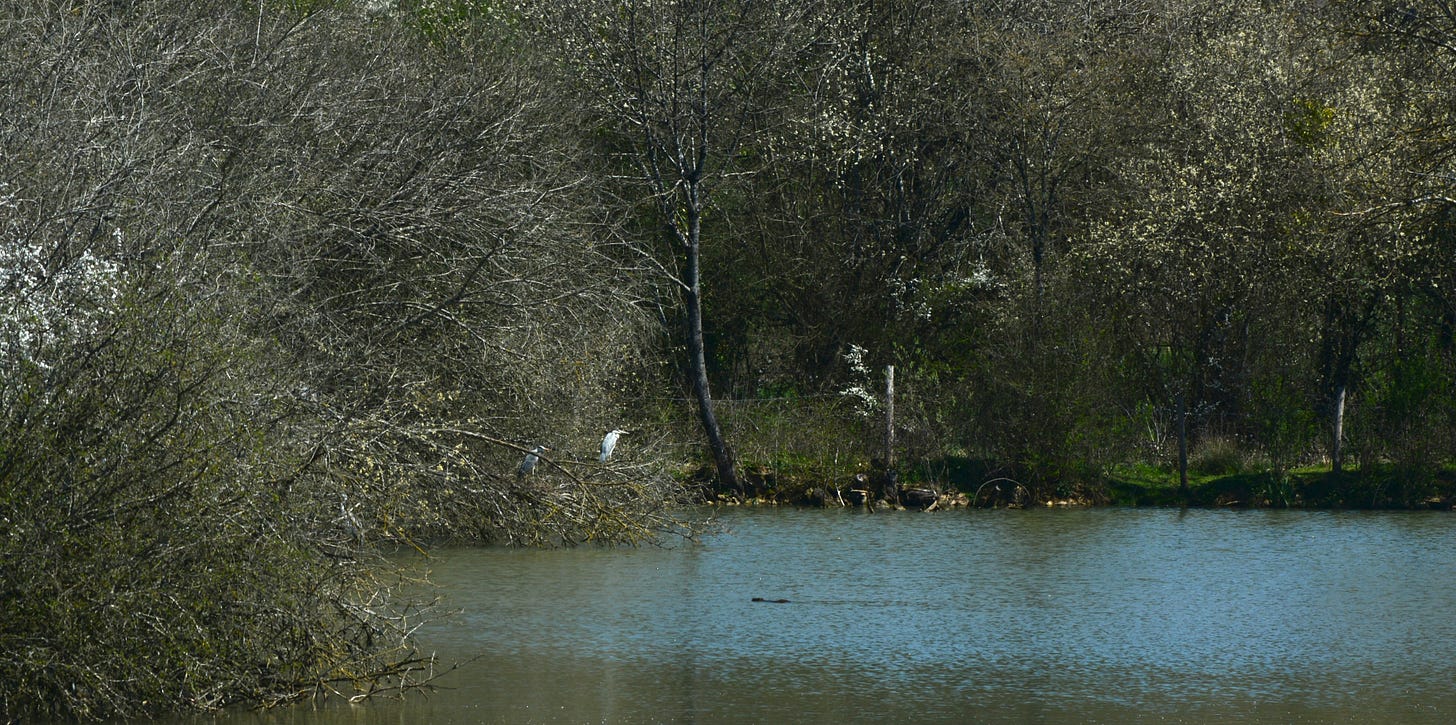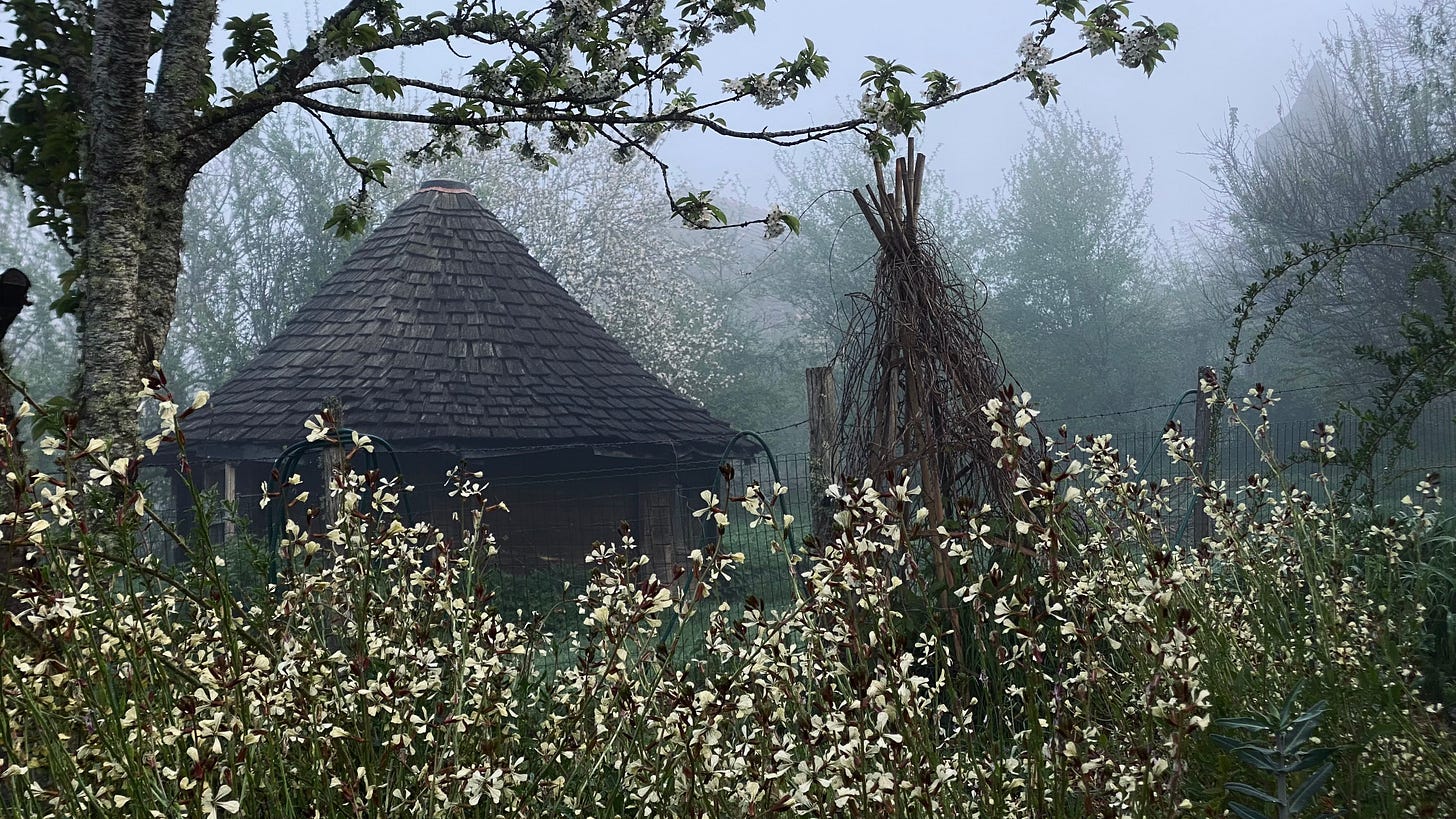Meetings...
I have lunch with a pied wagtail and two butterflies at an opera and try to photograph some coypu!
Dearest everyone, welcome back, old friends and new I am delighted you are here. Thank you for spending precious moments of your time with me on my hill.
Spring has taken a little step backwards as it often does in April, winter, always having to have one final word is running true to chilly form! It is fresh, too fresh for young fruit just setting, a cold mist lurking over the valleys may or may not make a showing on the hill, for once I don’t wish it. Everything is too lusciously verdant, too buzzing with new life, let it be, go away Winter!
I am behind schedule with everything garden related but the days are so filled with oddly delicious encounters with small creatures enjoying spring light and warm weather—some quietly soaking up the sumptuous glow, others in cacophonous abandon—I refuse to succumb to anything even vaguely resembling panic.
And, Rosie arrives in three days and two hours one day, one hour and thirty minutes at the train station in Capdenac and yes, I have been counting!
“Sun, you hammer of yellow,
you hat on fire,
you honeysuckle mama,
pour your blonde on me!
― Anne Sexton
On a lunchtime when I have time enough to walk a loop around the village…
Leaving one school to begin at another in two hours time—a veritably uncommon treat any day, not to mention a sunny spring day—I dilly-dally along a lane soon to be lined by clouds of cow parsley hanging so low it will be obscured completely, towards the edge of the village and a stony track leading to a small lake. The inhabitants, I have a hunch, will be sunbathing.
The lake languishes quietly in a field below me, even from a distance I can count dozens of dark rock-like shapes; the1coypu I hoped for. They are scattered around the edges in what seems to be small family groups and whilst these animals are detested creatures by any land owner, I am excited! Alas, the lake is fed by a stream flowing under the path which filters into various shallow dykes and all have overflowed. The land is flooded. Any access I might have used to gain even vaguely close proximity is impossible when dressed in clothes that need to remain clean for imminent classes. I curse my old head, ponder—very briefly—the idea of taking a wide angled hike up over the hill whereby returning on the far side to the only shaded bank and a more clandestine route but resign myself to watching from a distance. Time is against me even with such a long lunch break. Besides, I hadn’t considered spring growth, the grass has doubled in height since last weeks visit—when I didn’t see any—from this lower vantage point, if any basking in the midday sun is being undertaken by coypu I am unable to see.
As I climb a little despondently back up the path I do spy three or four gambolling playfully in the midday sun, far too distant—of course—to even bother raising my camera. On the opposite side of the lake a heron, silent, stately, sagaciously oblivious to rascal rodents—my foolishness—is seemingly just enjoying warm spring sunshine. I wait an age for him to spot me and take flight determined to have one photo to carry home but he remains like a statue, motionless. I have a hunch he was sunbathing!

I meander on, cross the lane at the end of the path, under the fizzing lines of pylons connected by swaying wires over fields stretching far into the distance. I walk along a farm track where a young dog befriends me, we continue on together; I ask his name but he is too shy to answer. As we near the end of the track, a noise becomes increasingly louder, like a flock of birds I don’t recognise, coming from not so far away. I stop to listen, the dog also, cocking his ears as if he too is trying to place the sound. ‘Frogs’ I tell him repeating the word in French, ‘se sont des grenouilles’. We continue walking, he gives me a bewildered, almost fearful look, follows on until we reach another lane, then, as if the noise is just too much for his young ears, looking at me with apology in his doleful eyes, turns back.
The noise, like instruments warming up for an orchestra in preparation for an opera is coming from an abandoned quarry where I know there is a bench. I had planned to stop a while to eat my lunch, if the frogs wish to serenade me while I dine, so be it. The moment I reach the edge of the water however, the rehearsal ends. Possibly relieved by the sudden quiet, two butterflies and a pied wagtail join me as I settle on my sunny, rather damp seat. Above me a buzzard—less inclined to sociability—circles the quarry. The wagtail hops from bolder to branch pecking at this and that, seemingly occupied with spring chores, uninterested in either me or my food though I do offer to share it. The butterflies flutter, as butterflies tend mostly to do and for a few minutes there is absolute silence. Then, one by one, the instruments play their opening chords, the voices of the opera begin again, first the sopranos, the contraltos picking up the beat next, then the tenors and the bass—a little out of tune I thought but I am no expert—until they reach a crescendo so loud I think perhaps I should have brought ear plugs rather than my lunch with me. Imagine, hundreds of frogs singing—and partaking in other joyful activities—on the first warm day of spring as you eat your lunch.
It is absolute, beautiful bedlam!

Briefly - One evening is almost so warm when I closed my eyes I could believe it was summer. A stag is barking close-by. Vociferous in branches in the unknown distance I hear the first cuckoo of the year. He arrives like the full-stop at the end of a sentence; a final clarification of the season blooming.
On a different, equally balmy evening, I watch the first swifts dipping and diving into empty barns at the château, then climbing so high into deepening blue velvet sky they disappear entirely into dusk; a dozen one day another dozen the next until the sky is filled with their feathered swooping loveliness. They are no less beautiful than they were the day they left; winged angels, elegant, agile acrobats in a cloudless sky. The sight of them in flight, to me in ungainly, limited human form, will never be anything but miraculous.
For the first time in the ten months since she has been with me, my sweet sad-faced Milly comes willingly to my side, accepting, finally, that she is safe, that she will not be harmed or starved or unloved. That she can trust me. My heart…
Much as I love my job—the one that pays the bills—the worry of being of any effective use to the children I am accorded each year, a permanent weighty anguish I carry home with me every night—often right through the night—causes much wringing of hands and self questioning. I know I do my best in the limited time and educational restraints I must work within but is it enough? More often than not the answer is a resounding no, a fact I am powerless to change and am prohibited to call into question. Again, my heart…
I have yet to plant any lettuce seeds, in fact I have yet to plant any seeds at all. I resign myself and my purse to market purchases instead. Surely there is no shame in that when on the first Monday of the holidays I wake to a garden that looks like magic has happened without me lifting a finger!
With love from this still breathless now….
This week I fell in love with;
This book compiled for International poetry month by Matthew Long
It is something wonderful! Please do download this magical book of poems, a work of art by unknown but incredibly talented authors gathered into a beautiful anthology.
Sadly, there is no doubt that coypu, ‘ragondin’ in French, cause serious damage to the quality of the environment they inhabit with disastrous consequences for some native species and the wider environment; water quality is often degraded as the natural filters provided by reeds and other waterside plants are removed, the result is the banks are undermined. The destruction of these plants also diminishes valuable sites for native birds and insects that depend on them either for nesting and cover from predators. There is also a question of economic damage, their extensive burrows cause land collapse close to the lakes they inhabit, if this land happens to be planted the crops are ruined. As a result these animals are widely hunted and killed.






Winter... I keep thinking of you wrongly as le Midi!
But singing frogs, I wish. They are not native here. Ours purr and I am too deaf with injudicious injury and old age. Long may they sing for France; more important than our ravens in the Tower of London. I told the youngsters in the Balkans where they sang in the middle of the City that it showed the place was still safe for health. Beware if they stopped!
We will soon have the cacaphony of frogs here, as well. A wonderful sound to lull one to sleep. x